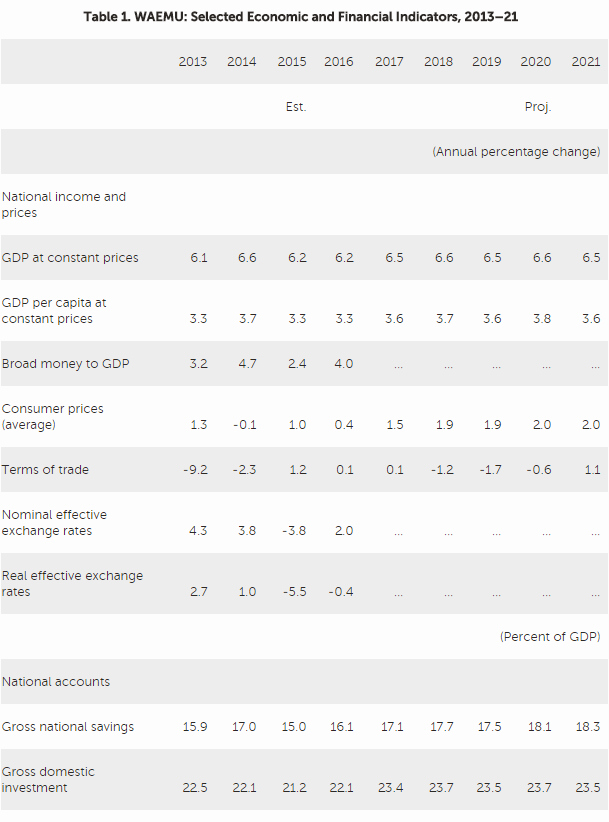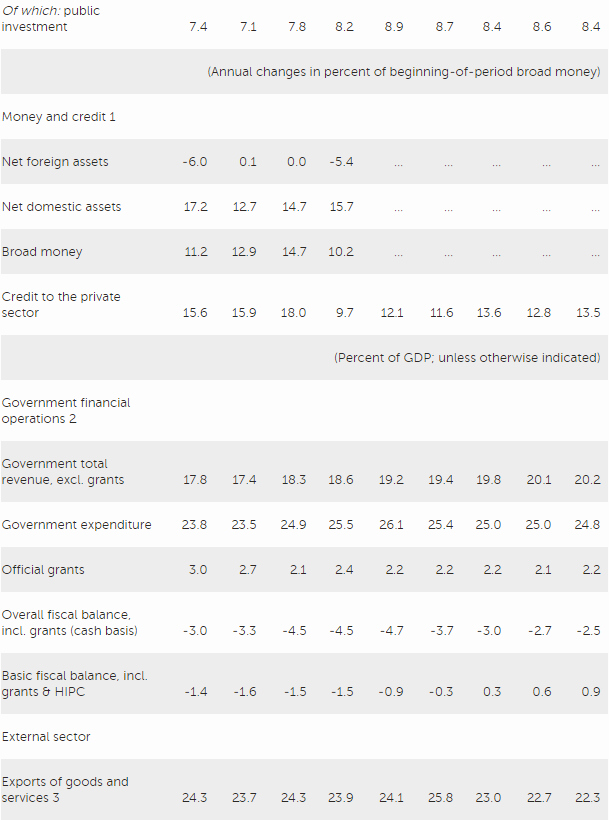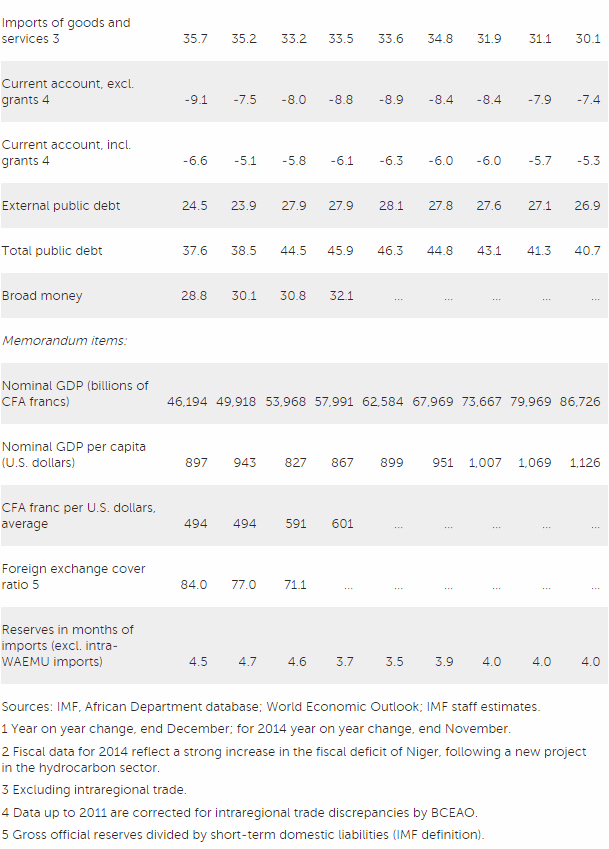IMF Executive Board Concludes Regional Consultation with West African Economic and Monetary Union
On March 31, 2017, the Executive Board of the International Monetary Fund (IMF) concluded the Article IV consultation with WAEMU.
Economic activity has remained strong but vulnerabilities have increased. Real GDP growth is estimated to have reached 6.2 percent in 2016, underpinned by robust and resilient domestic demand. Inflation remained subdued, at about 0.4 percent on average in 2016 due to continued solid agricultural production and low oil prices. Preliminary data suggest an overall fiscal deficit of 4.5 percent of GDP in 2016, higher than initially planned (4 percent). Credit to the public sector expanded at a significantly faster rate (43.6 percent) than credit to the private sector (9.7 percent). However, money growth remained moderate (10.2 percent), as net foreign assets declined. Public debt is on the rise and reserve coverage declined to 3.7 months of imports at End-December 2016, reflecting a continued expansion in public infrastructure and lower-than-expected external financing.
The BCEAO took measures to activate the interbank market and enhance monetary transmission mechanisms. In particular, the central bank widened the corridor between the minimum bid rate for the open market refinancing operations and the credit facility rate to 200 basis points, and announced that the recourse to its lending facility will be capped at twice banks’ capital starting June 2017. The central bank also reduced the reserve requirement ratio from 5 percent to 3 percent of deposits. Important steps were also undertaken to promote financial stability. These reforms include the adoption of Basel II and III capital standards and the introduction of consolidated supervision. Nonetheless, conditions in the banking sector remain challenging. Credit and concentration risks are important, and the ratio of gross NPLs to total loans is still relatively high, while the situation of several troubled banks remains unresolved.
The outlook remains positive provided there is continued macroeconomic stability and resolve to improve the business environment and promote private investment. Growth is projected to stay above 6 percent over the medium term, and inflation would remain low on account of continued solid agricultural production. Risks are tilted to the downside and stem from delays in fiscal consolidation, slow progress in raising public investment efficiency and advancing private-sector friendly structural reforms, sharper slowdown of world economic growth, tighter international financing conditions, as well as a sustained decline in cocoa prices. In addition, security risks remain important.
Executive Board Assessment
Executive Directors agreed with the thrust of the staff appraisal. They welcomed the region’s continued strong economic performance, with robust growth and low inflation. Directors noted, however, that risks to public debt sustainability and external stability have risen. They underscored that sustaining high growth would require well‑coordinated and consistent national fiscal policies and regional monetary policy to contain vulnerabilities and safeguard macroeconomic stability. While the main responsibility in this regard falls on national and regional authorities, Directors noted that the Fund could play a key role through policy advice and capacity building. Structural reforms will also need to be accelerated to improve the business environment, boost competitiveness, and promote diversification.
Directors underscored that growth‑friendly fiscal consolidation is key to reducing public debt and rebuilding foreign reserves buffers. They urged Member countries to adhere to their current budget deficit reduction plans. Directors emphasized that adjustment efforts should be carefully calibrated and should focus on reforms to enhance revenue mobilization and contain current expenditure while protecting priority capital and social spending. They encouraged the authorities to further improve public financial and debt management, enhance spending quality and efficiency, and develop alternative forms of financing to support infrastructure investment while being mindful of associated risks.
Directors supported the current monetary policy stance. They welcomed recent monetary policy decisions to tighten access to the refinancing window. They noted, however, that the lowering of reserve requirements aimed at enhancing liquidity would partly offset the December tightening. Directors called on the authorities to remain vigilant and stand ready to further tighten monetary policy if pressures on external reserves continue. They encouraged them to take steps to further improve liquidity management, energize the interbank market, deepen financial markets, and strengthen monetary policy transmission.
Directors commended the authorities for the ambitious set of regulatory reforms to modernize the financial sector. They highlighted the importance of adequately preparing for the effective implementation of the upgraded regulatory and prudential frameworks, making the financial safety net operational, and developing an effective regional bank resolution regime. They also encouraged the authorities to step up efforts to address the current pockets of vulnerability in the banking system by enforcing existing prudential regulations.
Directors welcomed the new regional action plan and strategy for financial inclusion. They called for its rapid implementation, emphasizing that financial deepening and inclusion are essential to sustain high and inclusive growth. They highlighted the importance of lowering the cost of financial services, strengthening the legal framework and judicial processes, enhancing the business environment, and boosting the development of mobile banking, while paying due consideration to financial stability and anti‑money laundering issues.
Directors urged the authorities to intensify the pace of structural reforms to sustain the growth momentum. They called, in particular, for continued efforts to promote private investment, competiveness, and diversification by improving the business environment, reducing barriers to regional trade including cumbersome administrative procedures, and enhancing regional infrastructure.
Directors encouraged the authorities to continue their efforts to improve the quality, coverage, and timeliness of regional data, in particular external sector statistics and financial soundness indicators.
On April 5th, the views expressed by Executive Directors will form part of the Article IV consultations with individual member countries that take place until the next Board discussion of WAEMU common policies. The next Article IV consultation discussion with the WAEMU regional authorities will be held on the 12‑month cycle in accordance with the Executive Board decision on the modalities for surveillance over WAEMU policies.



Source: International Monetary Fund
- 318 reads
Human Rights
Fostering a More Humane World: The 28th Eurasian Economic Summi

Conscience, Hope, and Action: Keys to Global Peace and Sustainability

Ringing FOWPAL’s Peace Bell for the World:Nobel Peace Prize Laureates’ Visions and Actions

Protecting the World’s Cultural Diversity for a Sustainable Future

Puppet Show I International Friendship Day 2020

